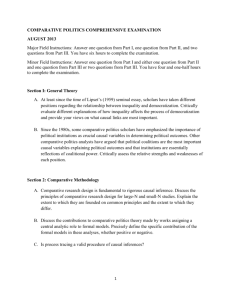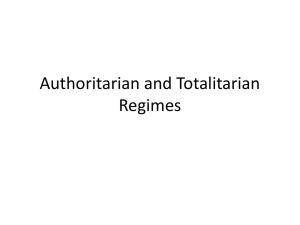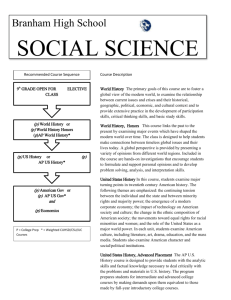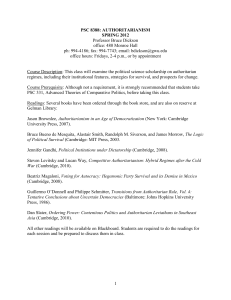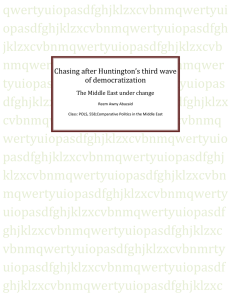Authoritarian Politics - University of Michigan
advertisement
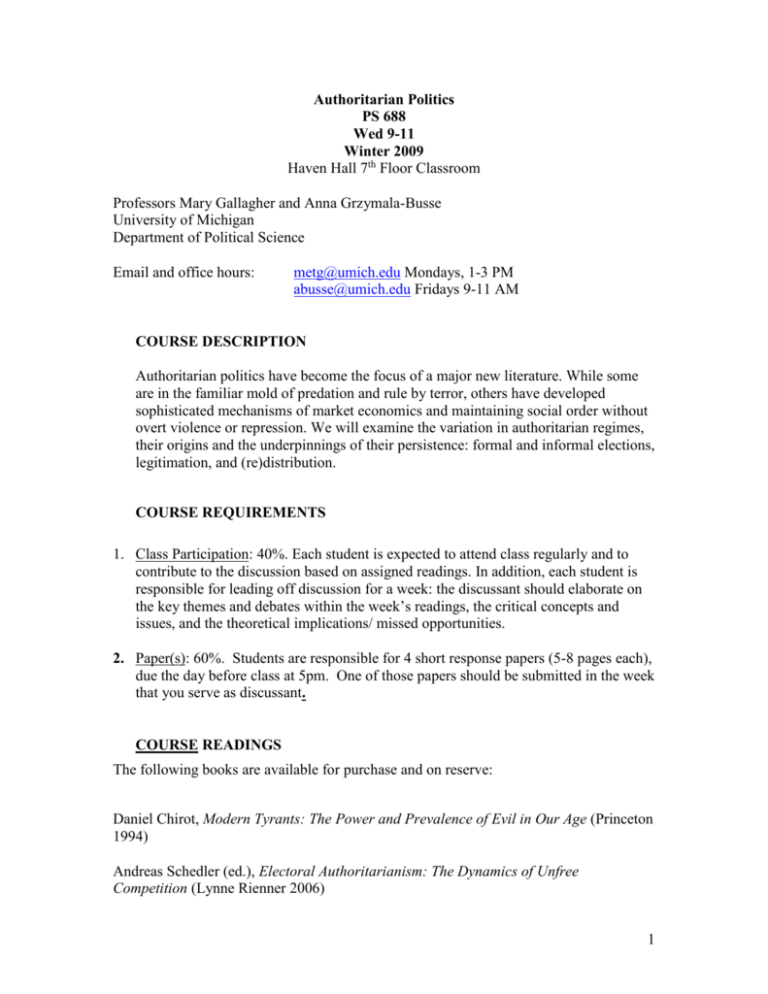
Authoritarian Politics PS 688 Wed 9-11 Winter 2009 Haven Hall 7th Floor Classroom Professors Mary Gallagher and Anna Grzymala-Busse University of Michigan Department of Political Science Email and office hours: metg@umich.edu Mondays, 1-3 PM abusse@umich.edu Fridays 9-11 AM COURSE DESCRIPTION Authoritarian politics have become the focus of a major new literature. While some are in the familiar mold of predation and rule by terror, others have developed sophisticated mechanisms of market economics and maintaining social order without overt violence or repression. We will examine the variation in authoritarian regimes, their origins and the underpinnings of their persistence: formal and informal elections, legitimation, and (re)distribution. COURSE REQUIREMENTS 1. Class Participation: 40%. Each student is expected to attend class regularly and to contribute to the discussion based on assigned readings. In addition, each student is responsible for leading off discussion for a week: the discussant should elaborate on the key themes and debates within the week’s readings, the critical concepts and issues, and the theoretical implications/ missed opportunities. 2. Paper(s): 60%. Students are responsible for 4 short response papers (5-8 pages each), due the day before class at 5pm. One of those papers should be submitted in the week that you serve as discussant. COURSE READINGS The following books are available for purchase and on reserve: Daniel Chirot, Modern Tyrants: The Power and Prevalence of Evil in Our Age (Princeton 1994) Andreas Schedler (ed.), Electoral Authoritarianism: The Dynamics of Unfree Competition (Lynne Rienner 2006) 1 Kapuscinski, Ryszard. 1982. The Shah of Shahs. New York: Vintage Press. SCHEDULE Week 1, January 7: INTRODUCTION Week 2, January 14: Approaches: Totalitarianism and its Analytical Heirs Chirot, entire book. Richard Snyder, “Beyond Electoral Authoritarianism: The Spectrum of Non-Democratic Regimes,” in Schedler (ed.), Electoral Authoritarianism, pp. 219-231. Week 3, January 21: Origins: Coalitions, Colonies, and Legacies Acemoglu and Robinson, Economic Origins of Dictatorship and Democracy (Cambridge 2006), 1-87; 173-220; 255-285. Carles Boix, Democracy and Redistribution (Cambridge: Cambridge University Press, 2003), 1-43. Daniel Ziblatt, “Does Landholding Inequality Block Democratization? A Test of the Bread and Democracy Thesis and the Case of Prussia” World Politics 60 (July 2008). Week 4, January 28: Military and Sultanistic Rule Note: We will meet for an hour only on Wed. Please attend the Phil Keefer Talk, Jan 30th 12-1:30, Eldersveld Room, Haven Hall for further discussion Steven A. Cook, Ruling But Not Governing: The Military and Political Development in Egypt, Algeria, and Turkey, Baltimore: Johns Hopkins University Press (2007), pp. 1-31. Alfred Stepan, Rethinking Military Politics: Brazil and the Southern Cone, Princeton: Princeton University Press (1988), pp. 3-29. Brownlee, Jason. 2007. “Hereditary Succession in Modern Autocracies,” World Politics 59, 4: 595-6328. Ryszard Kapuscinski, Shah of Shahs, entire. Week 5, February 4: One Party Rule Samuel P. Huntington, Political Order in Changing Societies (Yale 1968): 397-461. 2 Kenneth Greene, Why Dominant Parties Lose: Mexico’s Democratization in Comparative Perspective (2007), New York: Cambridge University Press, pp. 1-47. Benjamin Smith, “Life of the Party: The Origins of Regime Breakdown and Persistence under Single-Party Rule,” World Politics 57:3 (Spring 2005), pp. 421-451. Grzymala-Busse, Anna. 2002. Redeeming the Communist Past. New York: Cambridge University Press, 19-68. Week 6, February 11: Legitimation and Compliance Lisa Wedeen, Ambiguities of Domination: Politics, Rhetoric, and Symbols in Contemporary Syria (Chicago 1999): chapters 2 and 3,: 32-86 Margaret Levi, 1998. Consent, Dissent, and Patriotism. New York: Cambridge University Press.: 200-219. Stockmann, Daniela and Mary Gallagher. (2008). “Media and Authoritarian Rule: The Case of China,” forthcoming article. (on CTOOLS). Scott, James. 1985. Weapons of the Weak. New Haven: Yale University Press: Chapters 1 and 2. Week 7, February 18: Order and Repression Watch The Lives of Others Gregory Kasza, The Conscription Society: Administered Mass Organizations, New Haven: Yale University Press (1995), pp. 7-25, 51-71, and 188-192. Garton Ash, Timothy. 1997. “The Romeo File”, The New Yorker, April 28: 162ff. Eva Bellin, “Coercive Institutions and Coercive Leaders,” in Marsha Pripstein Posusney and Michelle Penner Angrist (eds.), Authoritarianism in the Middle East: Regimes and Resistance, Boulder: Lynne Rienner (2005), pp. 21-41 Scott, James. 1998. Seeing Like a State. New Haven: Yale University Press, 9-83. February 25: NO CLASS Week 8, March 4: Elections and Authoritarian Rule Andreas Schedler, “The Logic of Electoral Authoritarianism,” in Schedler, ed. Electoral Authoritariansim: The Dynamics of Unfree Competition (Lynne Rienner, 2006). 3 Ellen Lust-Okar, “Elections Under Authoritarianism: Preliminary Lessons from Jordan,” Democratization 13:3 (June 2006), pp. 456-471. Steven Levitsky and Lucan Way. 2002. “The Rise of Competitive Authoritarianism,” Journal of Democracy, 13, 2: 51-65. Gibson, Edward. 2005. “Boundary Control: Subnational Authoritarianism in Democratic Countries,” World Politics, 58, 1, 101-132. Week 9, March 11: Law, Policymaking and the State Jennifer Gandhi and Adam Przeworski, “Authoritarian Institutions and the Survival of Autocrats,” Comparative Political Studies 40:11 (November 2007), pp. 1279-1301. Slater, Dan. “Iron Cage in an Iron Fist: Authoritarian Institutions and the Personalization of Power in Malaysia.” Comparative Politics 36:1 (October 2003), pp. 81-101. Pierre Landry and Yanqi Tong, 2005. “Disputing the Authoritarian State.” Paper prepared for presentation at the Annual Meeting of the American Political Science Association. Gretchen Helmke. 2002. “The Logic of Strategic Defection: Judicial Decision- Making in Argentina Under Dictatorship and Democracy.” American Political Science Review 96(2): 291-30. Week 10, March 18: Informal Institutions Kellee S. Tsai, “Adaptive Informal Institutions and Endogenous Institutional Change in China,” World Politics 59 (October 2006), pp. 116-141. Ledeneva, Alena. Blat: Russia’s Economy of Favours. Cambridge: CUP, 1998: 28-38, 139-174, 206-214. Lily Tsai, 2007. "Solidary Groups, Informal Accountability, and Local Public Goods Provision in Rural China", American Political Science Review, 101, 2 (May 2007), 355372. Darden, K. 2001. “Blackmail as a Tool of State Domination: Ukraine under Kuchma” East European Constitutional Review 10, 3. Week 11, March 25: Economic Growth and Performance Ronald Wintrobe, The Political Economy of Dictatorship, New York: Cambridge University Press (1998). Pages TBA. 4 Janos Kornai. 1992. The Socialist System (Princeton University Press,) chapters 11, 12, and 16. Pempel, TJ. “The Developmental Regime in a changing World Economy,” in Meredith Woo-Cumings, ed, The Developmental State. Ithaca: Cornell University Press, 1999: 137-181. Michael Ross, “Does Oil Hinder Democracy?” World Politics 53, No. 3: 325-361. Yingyi Qian. 2003. “How Reform Worked in China,” in Dani Rodrik, ed., In Search of Prosperity: Analytic Narratives on Economic Growth (Princeton University Press), pp. 297-333. Week 12, April 1: Redistribution: Clientelism and the Welfare State Beatriz Magaloni, Voting for Autocracy: Hegemonic Party Survival and Its Demise in Mexico (2006), New York: Cambridge University Press, pp. 1-43. Grzymala-Busse, Anna. 2008. “Beyond Clientelism: Incumbent State Capture and State Formation,” Comparative Political Studies, 41, 45. Wank, David. 1996. “The Institutional Process of Market Clientelism: Guanxi and Private Business in a South China City,” The China Quarterly, 820-838. Goldsmith, Arthur. 2004. “Predatory versus Developmental Rule in Africa,” Democratization 11, 3: 88-110. Week 13, April 8: Regime durability and Collapse Barbara Geddes. What Do We Know about Democratization After Twenty Years.” Annual Review of Political Science 2 (1999) OR Barbara Geddes, “Authoritarian Breakdown: Empirical Test of a Game Theoretic Argument,” paper presented at the annual meetings of the American Political Science Association, Atlanta (1999), pp. 1-33 + appendix. Benjamin Smith. “The Wrong Kind of Crisis: Why Oil Booms and Busts Rarely Lead to Authoritarian Breakdown.” Studies in Comparative International Development 40, No. 4: 55-76. Eva Bellin, “The Robustness of Authoritarianism in the Middle East: Exceptionalism in Comparative Perspective.” Comparative Politics 36, No. 2: 139-57. Timur Kuran, “Now out of Never”, in Liberalization and Democratization, Nancy 5 Bermeo, ed. (John Hopkins University Press, 1992). Steven Solnick, 1996. “The Breakdown of Hierarchies in the Soviet Union and China,” World Politics, 48, 2: 209-238. Week 14, April 15: Research Design and Fieldwork in Authoritarian Contexts Lily Tsai, “Quantitative Research and Issues of Political Sensitivity in Rural China,” in Allen Carlson, Mary Gallagher, Kenneth Lieberthal, and Melanie Manion eds. Studying Chinese Politics: New Sources, Methods, and Field Strategies (forthcoming). CTOOLS. ***Please come to this last meeting with a specific research question. We will discuss various challenges related to research design and fieldwork in authoritarian contexts.*** 6

